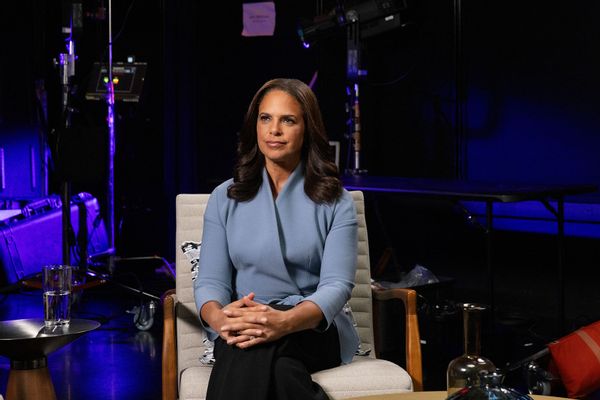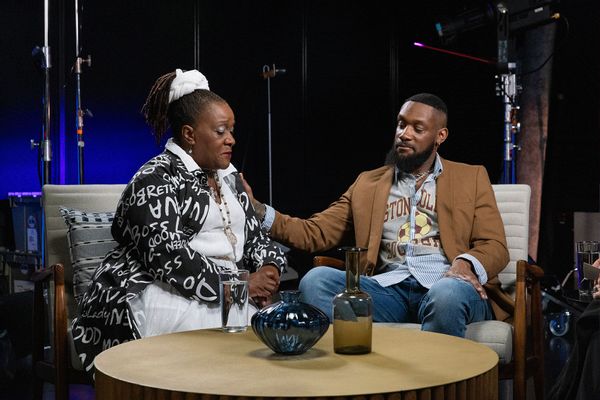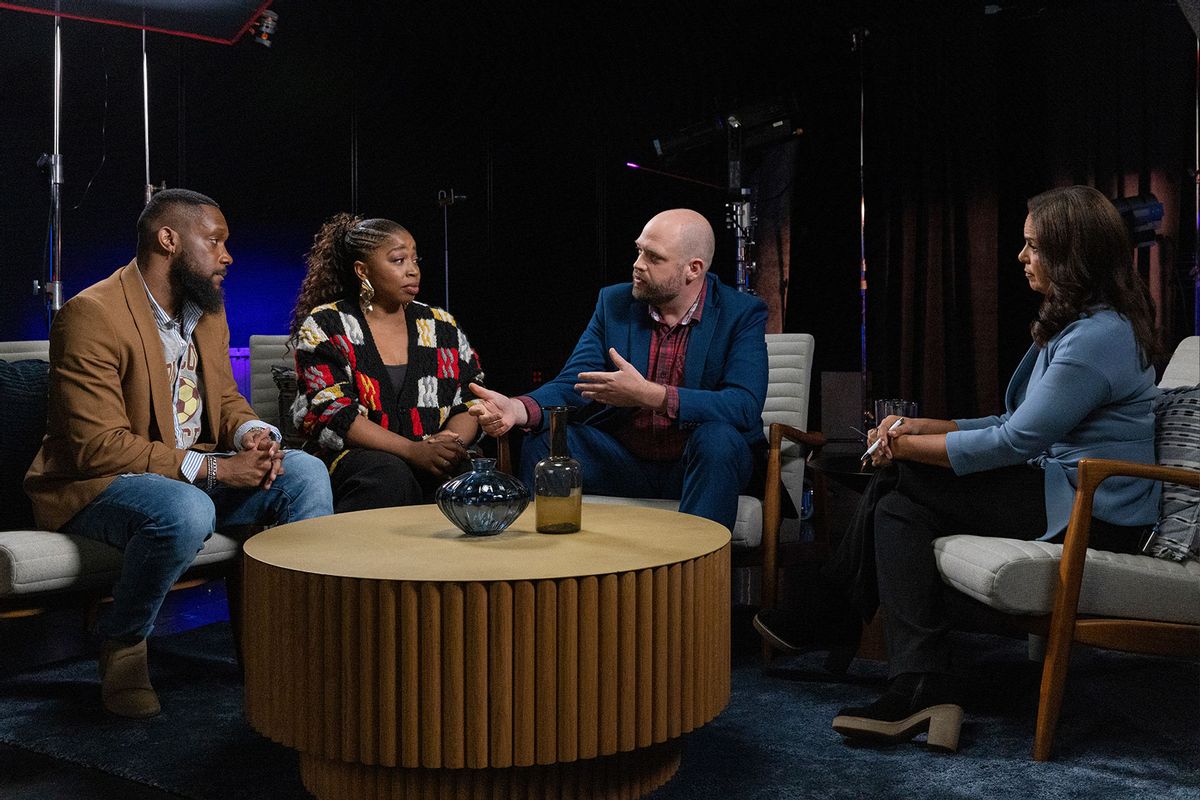It's often the case that the most difficult conversations to have — at both a personal level and as a societal collective — are also the most important.
Such is the case in "Quiet on Set: The Dark Side of Kids TV," Investigation Discovery's groundbreaking docuseries that illuminates allegations of systemic toxicity and abuse at children's television channel, Nickelodeon. Chief among those were claims leveled at Dan Schneider, the mind behind some of Nickelodeon's most popular shows, by former cast members and staffers. Separate from Schneider's behavior, "Quiet on Set" marked the first time former child actor Drake Bell publicly shared how he was sexually assaulted by Nickelodeon dialogue and acting coach Brian Peck when he was 15 years old, opening the door for critical conversations about innately hierarchical power structures between children and adults (and sometimes, interadult manipulation as well.)
"Quiet on Set" saw meteoric success following its March 17 premiere, so much so that directors Mary Robertson and Emma Schwartz elected to move forward with a fifth installment of the docuseries. Moderated by award-winning journalist Soledad O'Brien, "Breaking the Silence" will build upon the harrowing discoveries unearthed by the first four episodes by further excavating the dark underbelly of children's stardom. Interviewees previously featured in "Quiet on Set" — Drake Bell, sketch-comedy show "All That" cast members Giovannie Samuels and Bryan Hearne, and Hearne's mother, Tracey Brown — will return for the fifth episode, joined by another former "All That" star, Shane Lyons.
“With 'Breaking the Silence,' we’re digging deeper into the crucial conversations the docuseries ignited and exploring the lingering questions left in their wake to provide further insight from the brave voices who’ve spoken out previously and those who are coming forward again,” said Jason Sarlanis, President, TNT, TBS, TruTV, ID & HLN, Linear and Streaming, in a press release.
The "Quiet on Set" directors spoke to Salon about "Breaking the Silence" ahead of its forthcoming debut on Sunday, April 7, along with the pivotal onus we all share to protect children in the entertainment industry and more broadly.
The following interview has been edited for length and clarity.
This series has garnered immense interest, much of it positive for exposing dangers to minors in the industry. But it's also been very mixed. What would you say has been the most difficult or surprising reaction that you've had to address since "Quiet on Set" premiered?
Robertson: Honestly, primarily we've been deeply moved by the response to this project. The engagement has been so voluminous and sustained, and I think that we've seen a lot of sensitivity manifest and a lot of compassion for the contributors manifest. We've seen a lot of people engage in a reappraisal of their childhood and power structures and the entertainment industry. So it is nothing but gratifying to see the work foster compassion and ignite conversation.
 Quiet on Set: The Dark Side of Kids TV (Photo courtesy of Investigation Discovery) How did the conversations for a fifth episode start? Did you consider not doing it and what was required to sort of put it all together after the first four episodes came out?
Quiet on Set: The Dark Side of Kids TV (Photo courtesy of Investigation Discovery) How did the conversations for a fifth episode start? Did you consider not doing it and what was required to sort of put it all together after the first four episodes came out?
Robertson: Honestly, it came together so quickly. We knew, I think right after the trailer was released. The trailer went viral, the conversation started, there were questions and questions about questions and questions about questions, and I think we felt rather immediately that there was value that we could add in that moment, that the questions were fast moving and evolving and that there was value to sort of jumping in as soon as we could. So we enlisted award-winning journalist Soledad O'Brien. She brings such intelligence and sensitivity to her questioning. There's a cast member of "All That" who, after the documentary came out and he saw the reception, decided that he felt comfortable sharing his story. So he's coming forward and sharing his story. In the fifth episode, Gio and Brian and Brian's mother, Tracey, who were featured in the first four episodes are in this episode. They're engaging with a lot of the public response and some of the, you know, poignant and sometimes sharp questions that have emerged around the series. There's never before seen footage. And Drake Bell is also interviewed in this episode.
Schwartz: I'll just add here, I think part of what we saw was that the docuseries was creating a conversation beyond just the contours of the stories that we told in social media, in articles — articles like the one that you wrote, which I thought was fantastic — about sort of the system of child acting of kids' TV writ large. And we wanted to sort of continue to help be a part of that conversation and give a space to some of our participants to discuss the aftermath and their experience of this sort of growing conversation.
That's actually a great segue into my next question. In the first four episodes of "Quiet On Set," we see a statement from Nickelodeon that's presented again and again. What do you think is any network's sort of responsibility for the safety of minors? What should be happening on a corporate level and what kind of oversight could these networks be putting in place for kids who are at a developmental age, effectively?
Robertson: We all have responsibility for the safety of minors.
Schwartz: I think one thing that you're seeing from a number of the participants and one of the motivating forces for some of them to come forward and tell their story was a hope that there could be changes in more protections for kids put in place. And there's a range of what that can mean. If you go back in the 1938 federal legislation, there's a specific exemption for child entertainers. They don't have the same protections. We, by law, allow children to work in an adult environment without a lot of regulations. States have some of them, but it's very much a patchwork. And so there's a range of things that I know many of the people who participated or people in this space have been talking about. There's not universal background checks required for people working on sets with kids. We have requirements about schools. What about sets and whether there should be legislation in that space? You know, Jenny Kilgen has publicly written a letter to SAG-AFTRA, you know, asking them to re-examine the kinds of rules and protections they offer child actors. And you've heard from other participants calling for things like social workers or mental health specialists, people who can sort of engage with kids in their own sort of questions and discomforts that are not like their boss or their parents, where there's a lot of power dynamics at play. And so I think these are parts of the sort of conversations and movements that people are having. And obviously, it's always exciting to see people sort of take your work and see bigger actions and questions, even if we don't necessarily see ourselves as the advocates, but very excited to see where that heads and whether there are more protections that will come into play as a result.
 Quiet on Set: The Dark Side of Kids TV (Photo courtesy of Investigation Discovery)Going off of that, beyond Nickelodeon, are child labor laws and allegations of ethically unsound practices in the world of child entertainment and Hollywood more broadly something that you want to pursue more now? Could we see, say, Disney or the dark underbelly of the Food Network, for example?
Quiet on Set: The Dark Side of Kids TV (Photo courtesy of Investigation Discovery)Going off of that, beyond Nickelodeon, are child labor laws and allegations of ethically unsound practices in the world of child entertainment and Hollywood more broadly something that you want to pursue more now? Could we see, say, Disney or the dark underbelly of the Food Network, for example?
Robertson: We're passionate about the subject matter. We're devoted to continuing the lines of investigation. We're very much on it. And, you know, we're here. We're findable. We don't want to apply pressure. We know that some folks, unfortunately, have felt as though we've received pressure to come forward and share stories. We don't want to apply pressure on anyone to share a story — a very personal experience or an upsetting experience. But, you know, we're here if and when individuals with related accounts are ready. And I think that, we have been really moved by the amount of compassion sort of exhibited towards those who have come forward to share stories in the first four episodes.
Do you think this docuseries would have been different if Amanda Bynes, for example, had been able to participate in it? What do you think you're missing by not having Amanda's participation, for example?
Robertson: You know, we loved spending time revisiting the material from her early career. Everyone says she's so talented. There are so many people who speak so passionately about what she meant to them when she was growing up to see this young girl who was so funny, who was so versatile as a performer, who defied typecasting. You know, she was such a big part of that era at Nickelodeon and imprinted so deeply on the audience. You know, it's inconceivable to think of covering this era without honoring her talent and representing her talent. There are a lot of swirling questions around Amanda's experiences and her story. There's a lot of conspiracy. You know, there may be some facts. We tried to include that — I mean, we included that, which we could substantiate and left it at that.
Schwartz: And I'll just sort of add, I think, everyone is at a different place in terms of their openness, their processing and their own mental health about examining where they have been. And I think it's really important that we give people the space that they need to tell their stories when and if they ever are ready.
Absolutely. In an interview with The Hollywood Reporter, you noted that you were very curious about the letters of support for Brian Peck that are featured in episode four. Have you contacted anyone who wrote a letter and how would you plan on investigating the conditions under which those letters were written if you were to?
Roberston: We're very curious.
Schwartz: Before the series aired, we reached out to everyone who we named in the documentary. We sent them a copy of their letter and asked if they had any comment on that letter. And we included the responses that were received in the documentary. You know, we continue to have questions about the circumstances under which those letters were written, what people were told, what questions they asked, what questions they didn't ask about writing those letters.
One of the biggest issues with non-criminal allegations that "Quiet On Set" sort of lays out is the moral murkiness underpinning them, which is to say that Schneider seems to perpetually toe the line of unethical behavior. How have you responded to naysayers who may have disregarded some of the interviewees' claims of racism, sexism, and sexualization as subjective?
Schwartz: You know, I think that just because something isn't a crime doesn't mean that it's not impactful and doesn't mean that it doesn't have a long-standing impact on individuals who went through and experienced those. And I certainly leave it to people's judgment watching it, but I was very moved by the experiences that people shared in "Quiet On Set" about how, you know, they felt on those sets. And having spoken to people — not just people on camera — but many others who weren't willing to come forward, I know that there are many, many people for whom these skits, these power dynamics had huge impacts on their emotional and mental health for years to come.
Robertson: I've been paying attention to the positive responses that have been directed towards a lot of the contributors and the compassionate responses that have been directed towards them. I saw a lot of people online expressing shock and outrage that Jenny and Christy, the two women writers featured in the first episode, have been asked to split one salary. And I thought it was a really interesting response because we're not talking about a violent criminal act; but nonetheless many in the audience felt true outrage that that was their experience.
Read more
about this topic



Shares